The path to the Ivy League is long and competitive. Perfect grades and high test scores alone won’t secure you a spot in these prestigious universities. What sets you apart is your exceptional level of intellectual curiosity and well-roundedness. A big part of that is your ability to engage with a broad range of ideas and viewpoints.
This is where academic podcasts for Ivy League students become a powerful tool. Listening to podcasts is more than just entertainment; they are a gateway to the world of global thinkers, researchers, and professionals who are shaping the future.
By listening to the right podcasts, you not only expand your intellectual horizons but also gain content and ideas that you can use in your essays, interviews, and even personal projects. Podcasts enable you to engage with ideas and people from diverse fields, providing a unique intellectual opportunity that complements your formal education.
In this blog, I’ve carefully curated a list of 10 academic podcasts for Ivy League students, with a focus on intellectual growth and depth. Part 1 introduces the first five podcasts, and we’ll see how each can contribute to your academic profile and Ivy League application.
These podcasts will help you develop critical thinking, stay informed, and cultivate intellectual curiosity, traits highly valued by Ivy League admissions committees.
By regularly engaging with such podcasts, you’ll naturally increase your ability to form well-informed opinions and express complex ideas clearly, both of which are essential in the Ivy League application process.
Why Podcasts Matter for Ivy League Preparation
1. Access to Experts
One of the most significant advantages of academic podcasts for Ivy League students is the direct access they provide to thought leaders, Nobel laureates, and world-class thinkers. Listening to their conversations exposes you to the latest research, trends, and insights in various fields, including science, economics, politics, and philosophy.
For an Ivy League applicant, this demonstrates intellectual curiosity and a proactive approach to learning, both qualities that admissions officers value.
Engaging with these experts through podcasts allows you to step into their world and gain fresh perspectives on important issues that may not be covered in traditional academic settings.
Example: A student applying to Yale referenced an episode from Freakonomics Radio in their essay about human behavior and decision-making, demonstrating how the podcast reshaped their perspective on societal issues.
By tapping into academic podcasts for Ivy League students, you can continuously refine your own thinking and knowledge base.
2. Enhancing Critical Thinking
Critical thinking is at the heart of Ivy League education. Podcasts encourage you to engage with complex ideas, analyze multiple viewpoints, and think critically about issues that may not be discussed in high school textbooks. This aligns perfectly with what Ivy League schools look for: students who can think independently and approach problems from diverse angles.
Podcasts offer a great way to engage with interdisciplinary topics that require critical thinking and connecting different ideas. Whether it’s the latest discussions on climate change, philosophy, or politics, the ability to analyze these topics critically will help you in the admissions process and beyond.
Example: A student applying to Princeton used insights from academic podcasts for Ivy League students such as The Ezra Klein Show to explain how different political philosophies influence modern governance, which set them apart during the interview.
3. Fostering Interdisciplinary Learning
At Ivy League schools, students are encouraged to think beyond the boundaries of a single discipline. Many academic podcasts for Ivy League students explore ideas that bridge multiple fields of study, including ethics, economics, technology, and politics. This approach fosters interdisciplinary thinking, a skill that’s vital in a dynamic, globalized world.
Learning to think across disciplines not only enhances your academic abilities but also helps you stand out as a candidate who can bring diverse ideas and perspectives to the Ivy League. Whether you’re passionate about political science, environmental sustainability, or artificial intelligence, interdisciplinary thinking helps you develop a broader understanding of the world.
Listening to academic podcasts for Ivy League students will give you the ability to weave together information from multiple fields to create a more nuanced understanding of complex issues.
4. Strengthening Communication Skills
Podcasts are an excellent way to enhance your communication skills. By listening to skilled hosts and thought leaders, you learn how to articulate complex ideas clearly, which is essential for writing essays and performing well in interviews.
The ability to communicate effectively, whether in writing, speaking, or interviews, is crucial for your Ivy League application.
By regularly listening to academic podcasts for Ivy League students, you can learn to express complicated topics clearly and concisely, which will help you refine your essay-writing and interview skills.
5. Building a Unique Profile
By mentioning academic podcasts for Ivy League students that have inspired your thoughts or projects, you demonstrate intellectual initiative, something that’s crucial for your Ivy League application. These podcasts become a part of your story, showcasing that you don’t just absorb knowledge from school but actively seek it out in the world around you.
Podcasts can be used to show admissions officers that you are not only passionate about academics but also about continuous learning outside the classroom. They can be used to back up the ideas you present in your personal statement or in interviews. Engaging with academic podcasts for Ivy League students shows that you’re proactive and intellectually curious.
You Can Also Check: 7 Social Impact Projects for Ivy League Schools That Get You Noticed
The 10 Academic Podcasts Every Future Admit Should Know
1. The EdSurge Podcast
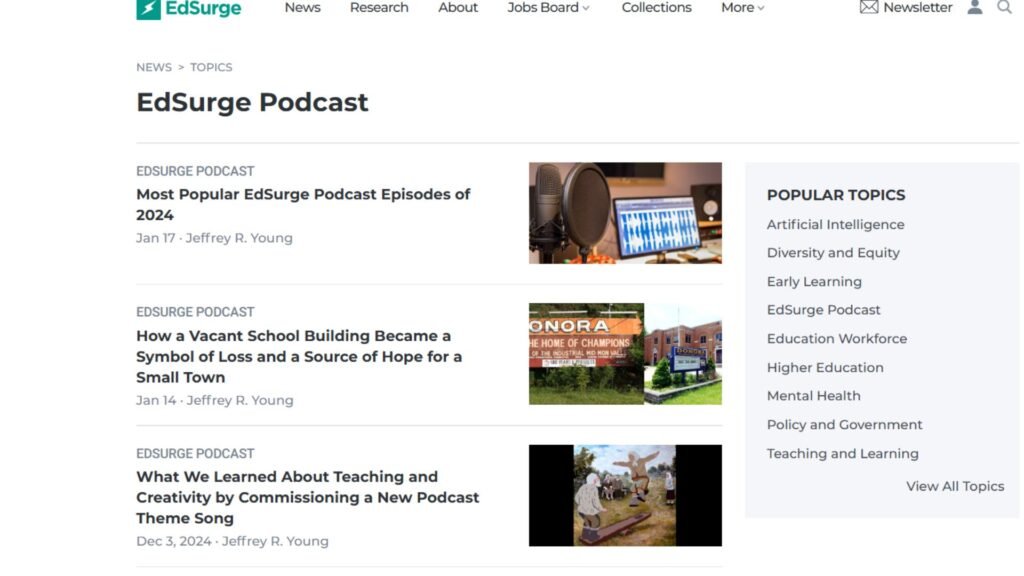
Overview:
The EdSurge Podcast covers the intersection of technology, education, and the future of learning. Hosted by leaders in the education technology space, the podcast features interviews with educators, researchers, and innovators who are reshaping the future of education. Topics include everything from new digital tools to the ethics of artificial intelligence in the classroom.
Why It Matters:
For academic podcasts aimed at Ivy League students, The EdSurge Podcast offers valuable insights into the future of education and learning. Ivy League students are often at the forefront of educational innovation, and staying informed about the latest developments in education technology can provide a unique perspective in your application essays and interviews. This podcast not only expands your knowledge about the future of learning but also encourages interdisciplinary thinking by covering various fields, including technology, ethics, and education.
Listening to The EdSurge Podcast will enhance your understanding of the evolving educational landscape and help you stay informed about the discussions shaping the future of academia.
Student Strategy:
Incorporate themes from the podcast into essays about the future of education or the role of technology in learning.
Stay up-to-date with the podcast’s discussions on education technology, which will help you engage in academic conversations during interviews.
Link: The EdSurge Podcast
2. Lex Fridman Podcast
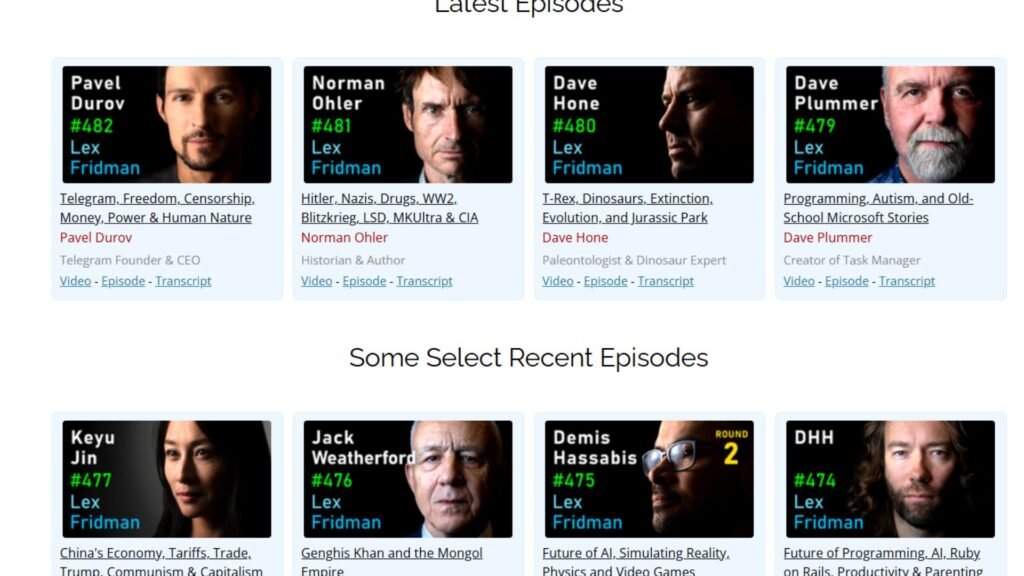
Overview:
MIT researcher Lex Fridman interviews top scientists, engineers, philosophers, and AI experts on a range of topics, from artificial intelligence to consciousness. Fridman brings the perspectives of prominent thinkers who are shaping the future of technology, society, and human understanding.
Why It Matters:
This podcast is essential for students interested in STEM, particularly those pursuing careers in AI, engineering, or data science. The intellectual discussions cover deep technical topics while addressing the ethical implications of these advancements.
Listening to academic podcasts for Ivy League students, like the Lex Fridman Podcast, can help you frame your application essays around innovation and societal impact.
Student Strategy:
For STEM applications, use an episode about AI or robotics as the foundation for an essay on innovation.
Challenge yourself by summarizing complex technical concepts and incorporating them into your personal statement to enhance its effectiveness.
Link: Lex Fridman Podcast
3. Freakonomics Radio
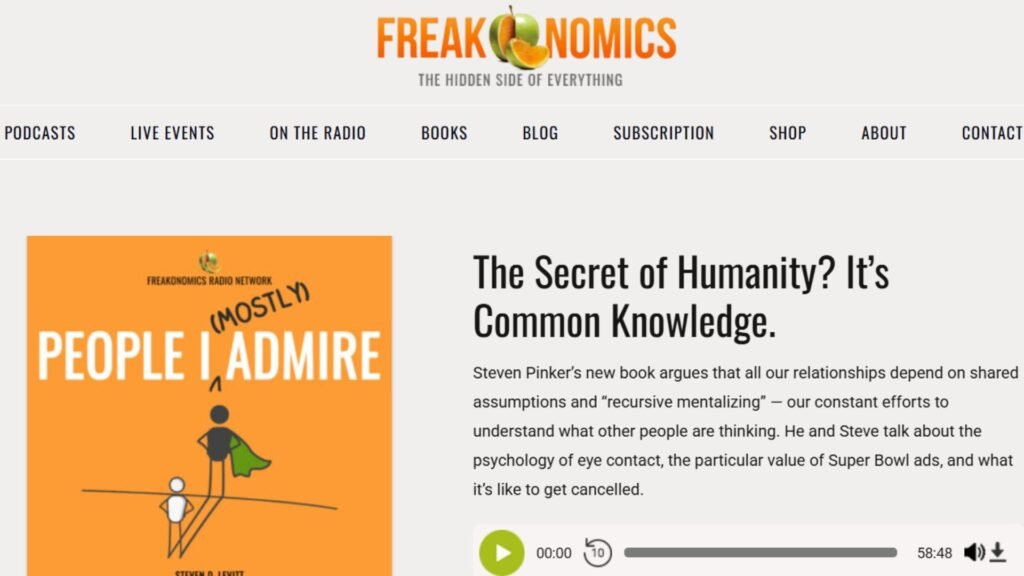
Overview:
Hosted by Stephen Dubner, Freakonomics Radio delves into the hidden side of everything, from economics and human behavior to business practices and societal norms. The show’s ability to explain complex topics in an engaging manner makes it an essential listen for Ivy League applicants.
Why It Matters:
Ivy League admissions committees value applicants who can see connections between different fields. Academic podcasts for Ivy League students, such as Freakonomics, help you connect economics with psychology, sociology, and human behavior —skills that are crucial for writing insightful essays and acing interviews.
By listening to Freakonomics, you’ll gain fresh perspectives on topics like economic inequality, voting behaviors, and educational systems, which can inform your essays and interviews.
Student Strategy:
Use insights from the podcast to support your arguments in essays about leadership or societal change.
Make connections between economics and other areas such as education, politics, and social change.
Link: Freakonomics Radio
4. TED Talks Daily
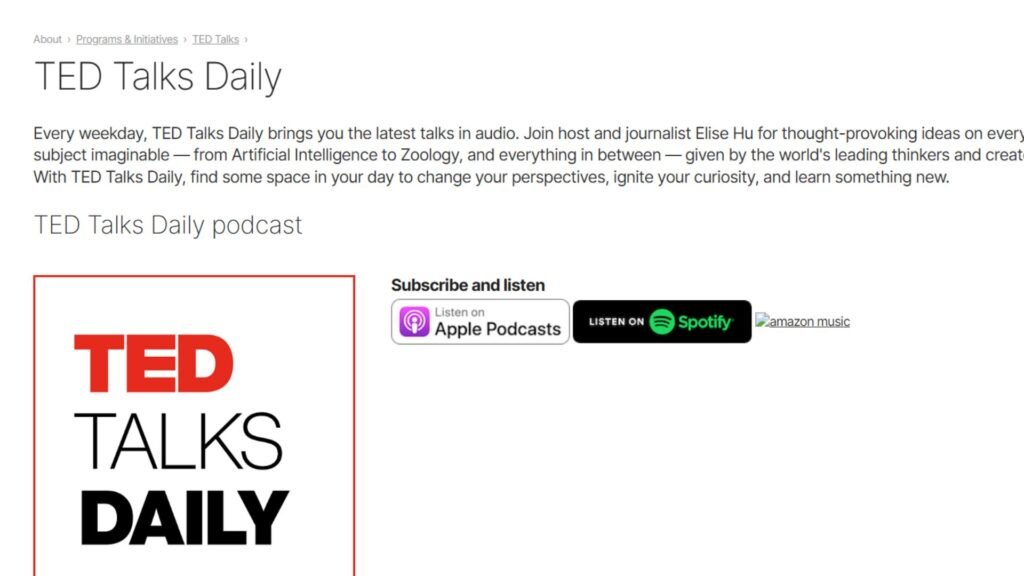
Overview:
TED Talks Daily brings you some of the best short talks on topics such as science, technology, psychology, and personal growth. Each episode offers a comprehensive exploration of a single idea or concept, making it an ideal resource for students seeking to broaden their knowledge and intellectual perspective.
Why It Matters:
TED Talks are globally recognized for sparking innovative ideas. For Ivy League students, these talks provide an excellent opportunity to stay current on emerging trends, from sustainability to mental health, and to consider how these issues relate to their field of study.
Many of the ideas presented in TED Talks encourage interdisciplinary thinking, which is a skill highly valued by Ivy League schools.
Student Strategy:
Incorporate a TED Talk into your personal statement to showcase your intellectual curiosity. Explore episodes that address current global issues, which will provide you with valuable talking points during interviews.
Link: TED Talks Daily
5. The Daily (New York Times)
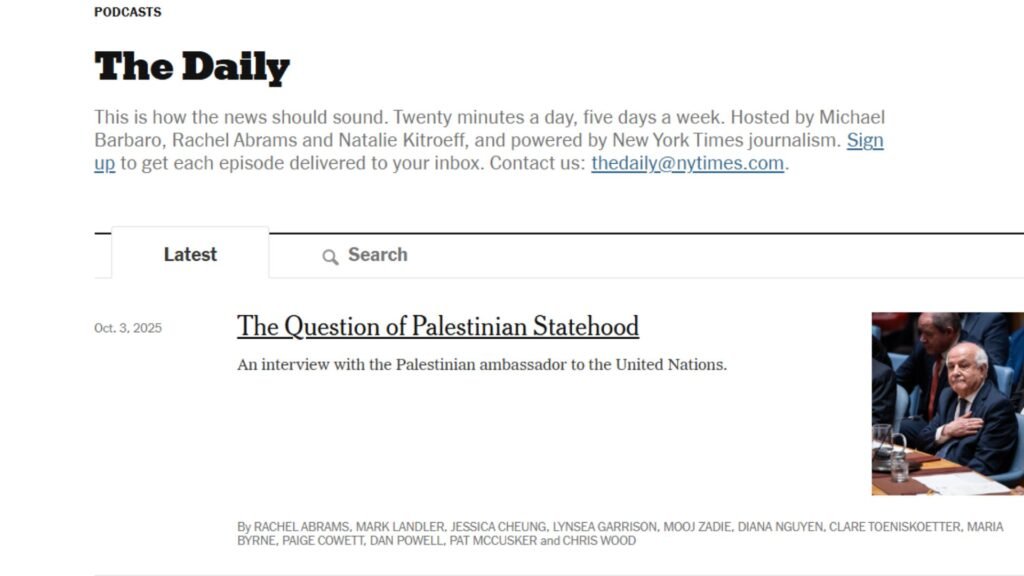
Overview:
The Daily is a 20-minute podcast from The New York Times, offering deep dives into one major news story each weekday. It covers everything from political events to global conflicts, providing analysis and context that helps listeners understand the bigger picture.
Why It Matters:
For Ivy League applicants, staying informed about current events is essential. The Daily gives you the context you need to discuss the latest news thoughtfully, a necessary skill for acing interviews and writing essays.
By engaging with academic podcasts for Ivy League students, such as The Daily, you gain valuable insights into current global events and issues that you can use in your application.
Student Strategy:
Reference current events in your essays to show that you’re not only engaged with the news but also able to think critically about it.
Stay up-to-date with academic podcasts for Ivy League students to enhance your interview preparation and overall intellectual engagement.
Link: The Daily – New York Times
6. The Psychology Podcast
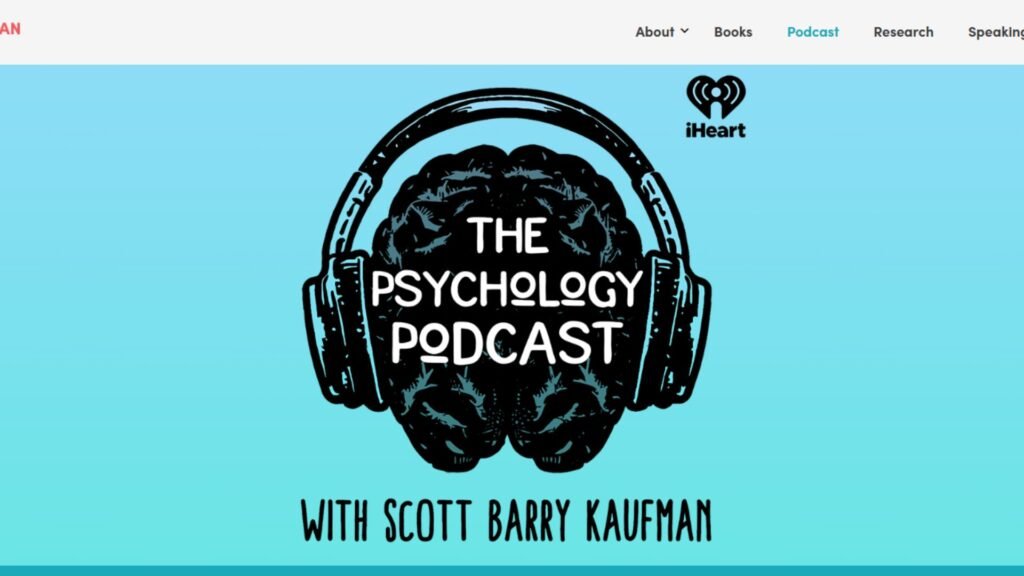
Overview:
Hosted by Dr. Scott Barry Kaufman, a renowned psychologist and professor, The Psychology Podcast explores a wide range of topics related to psychology, human behavior, and mental well-being. Kaufman speaks with leading researchers, authors, and experts to unpack complex psychological phenomena and their real-world implications.
Why It Matters:
For students applying to Ivy League schools with an interest in psychology, cognitive science, or behavioral economics, academic podcasts for Ivy League students, such as The Psychology Podcast, provide a deep dive into the workings of the human mind. Listening to these insightful episodes will enhance your understanding of psychological theories, mental health, and human motivation topics that are highly relevant in social sciences, humanities, and other interdisciplinary studies at Ivy League universities.
Through this podcast, you’ll learn how psychological research shapes societal norms, behavior, and decision-making, knowledge that can enrich your essays and interviews.
Student Strategy:
Use insights from The Psychology Podcast in essays related to human behavior, mental health, or social influence.
Mention episodes in interviews to highlight your ability to engage deeply with psychology and human dynamics, which are valued in Ivy League programs.
Link: Psychology Podcast
7. Planet Money

Overview:
Planet Money is an award-winning podcast from NPR that makes economics accessible, entertaining, and relatable. Hosted by a team of journalists, the podcast breaks down complex economic issues and explains their impact on everyday life, from global finance to consumer behavior.
Why It Matters:
Economics plays a significant role in Ivy League curricula, and Planet Money is perfect for students who want to understand the economic forces behind global events, policy decisions, and societal trends. The podcast also sharpens your ability to analyze and discuss financial issues critically, a skill Ivy League schools value highly.
By listening to academic podcasts for Ivy League students, such as Planet Money, you can gain a deeper understanding of the economic factors that shape the world. This will help you make informed arguments in your essays and interviews on topics related to financial policies, global events, or business strategy.
Student Strategy:
Use insights from Planet Money to enhance essays on economic policies or business strategies.
Practicing to explain economic principles in simple terms is an excellent preparation for discussions or interviews.
Link: Planet Money
8. The Tim Ferriss Show
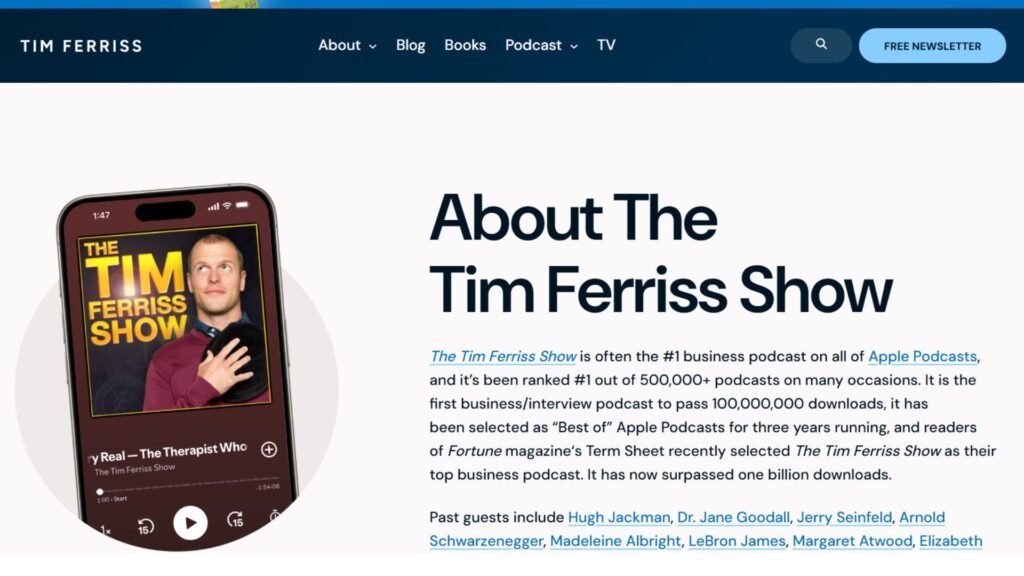
Overview:
Best-selling author Tim Ferriss interviews successful individuals from diverse fields, including business, technology, sports, and entertainment. The podcast focuses on actionable advice, routines, and strategies that can help you improve your life, career, and productivity.
Why It Matters:
While The Tim Ferriss Show may not be directly academic, it provides invaluable insights into the habits of highly successful people. For Ivy League applicants, it can help you build a mindset of excellence and efficiency qualities that are crucial for thriving in a competitive academic environment.
Many Ivy League applicants struggle with time management, productivity, and self-improvement, and Ferriss’s guests offer practical advice that can be directly applied to enhance your academic and personal growth.
Student Strategy:
Reference a podcast episode in your essay about time management, personal growth, or leadership.
Incorporate the lessons from Ferriss’s guests into your daily life to improve productivity and preparation for interviews.
Link: The Tim Ferriss Show
9. The Knowledge Project with Shane Parrish
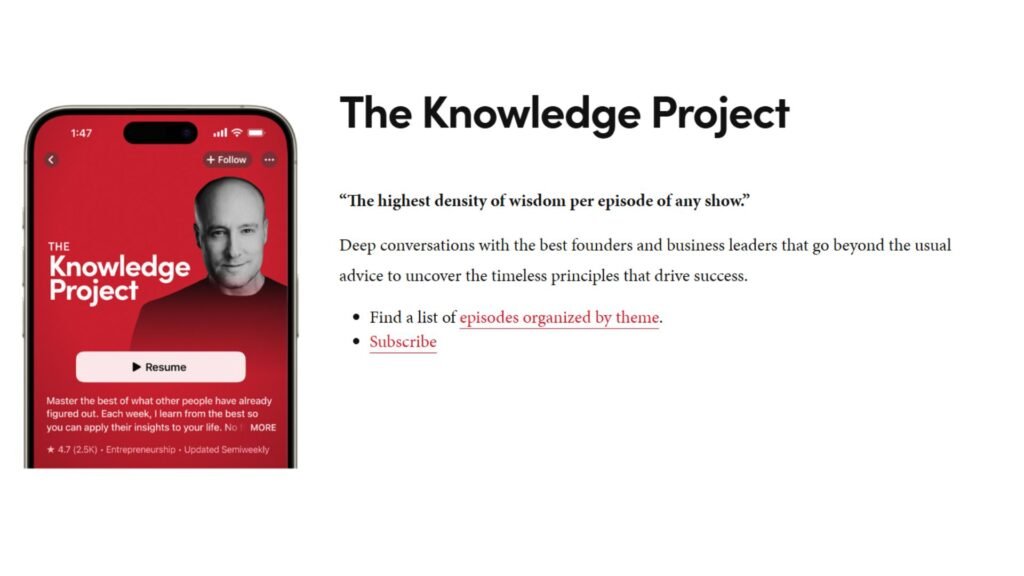
Overview:
Shane Parrish, founder of Farnam Street, hosts The Knowledge Project, a podcast that explores the mental models and frameworks that successful individuals use to think and make decisions. The show features experts from a diverse range of fields, including psychology, business, and philosophy.
Why It Matters:
This podcast is ideal for students interested in personal development, leadership, and making informed decisions. The Knowledge Project teaches you how to think more effectively, a skill that is vital in Ivy League discussions, essays, and research.
Listening to academic podcasts for Ivy League students like The Knowledge Project will help you become a more thoughtful and strategic thinker, which is key to excelling at the Ivy League level.
Student Strategy:
Apply mental models from The Knowledge Project to help you make better decisions when writing essays or working on group projects.
Use frameworks shared in episodes to organize your thoughts and arguments clearly for essays and presentations.
Link: The Knowledge Project
10. Big Brains (University of Chicago)
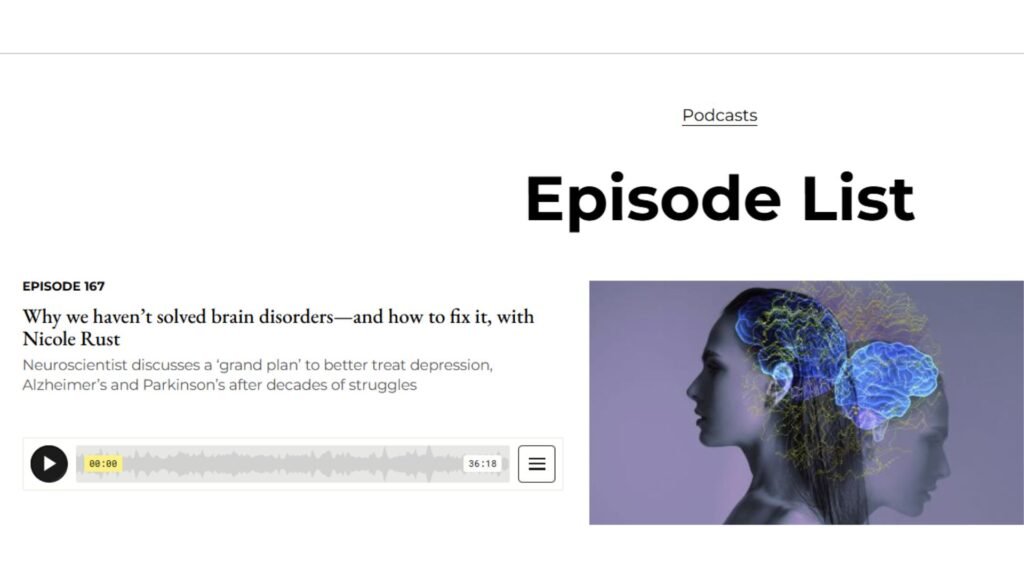
Overview:
Big Brains features groundbreaking research and academic discussions from University of Chicago faculty members. Episodes delve into cutting-edge topics in science, economics, and the humanities, providing deep insights into the world’s most complex questions.
Why It Matters:
For Ivy League applicants, this podcast offers direct exposure to academic thinking at the highest level. The discussions not only focus on the facts but also explore the intellectual process behind research, critical thinking, and hypothesis-building, essential skills for Ivy League students.
The conversations in Big Brains challenge you to think deeply and critically, skills that will enhance your research and academic writing. Engaging with this podcast enables you to understand how academic leaders break down complex problems, a valuable skill in Ivy League education.
Student Strategy:
Incorporate research from Big Brains into essays that explore complex academic or societal questions.
Discuss episodes in interviews to show that you engage with the latest academic research and are intellectually curious.
Link: Big Brains
FAQs
Q1. Can listening to podcasts really help my Ivy League application?
Yes, academic podcasts for Ivy League students can show admissions officers that you are engaged with the world around you and that you’re actively expanding your intellectual horizons.
Q2. How many podcasts should I listen to?
Stick with three to five podcasts that you genuinely enjoy and that align with your academic interests. It’s better to go deep rather than spread yourself thin.
Q3. How can I reference podcasts in my essays?
Rather than just name-dropping a podcast, explain how it influenced your thinking or shaped your view on a particular issue. This demonstrates that you can profoundly reflect on ideas.
Q4. Do I need to listen to all episodes?
No, focus on the episodes that align with your interests. Pick episodes that challenge your thinking and introduce you to new ideas.
Q5. How can I use podcasts for interview preparation?
Podcasts are a great resource for preparing answers to questions about current events, global issues, or complex academic topics. Being able to reference a podcast and discuss it thoughtfully will show that you are intellectually engaged.
Final Thoughts & Next Steps
As you prepare for Ivy League admissions, your intellectual curiosity will set you apart. Academic podcasts for Ivy League students are an excellent way to expand your knowledge and develop critical thinking skills. The podcasts we’ve covered in this guide will help you stay informed, think deeply, and communicate effectively, skills that Ivy League schools value.
Take action today:
- Select a podcast, listen to an episode, and reflect on the insights it provides.
- Use those insights in your essays, interviews, and projects.
- For structured guidance on your application, explore Essai, and track your progress with PIPPAMS
Start applying what you learn today, and set yourself up for success at the Ivy League.


